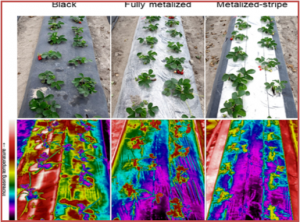Drs. Shinsuke Agehara and Vance Whitaker continue research on reflective mulch for strawberry production at Gulf Coast Research and Education Center.
Winter strawberry production in Florida experiences dramatic seasonal temperature variations: extreme heat during establishment, cool temperatures during the early and mid-harvests, and high temperatures during the late harvest. Traditionally, black plastic mulch has been used by Florida strawberry growers to achieve adequate wintertime soil warming. Although soil warming by black mulch is beneficial for promoting wintertime fruit production and ripening, it also intensifies the negative impacts of high temperatures. Strawberry flower and fruit development can be inhibited severely at temperatures exceeding 86 °F. Bare-root transplants are particularly susceptible to heat stress during establishment. Heat stress can result in slow and nonuniform growth, as well as weakened defense mechanisms against diseases and insects. Excessively high temperatures during the late harvest can also cause various problems, including excessive vegetative growth, soft fruit, and low soluble solids content.
Compared to black mulch, reflective mulch films (e.g., white and metalized) can reduce soil and mulch surface temperatures by reflecting a greater proportion of incoming solar radiation. Reflective mulch films can improve establishment and early fruit production of bare-root transplants particularly when planted before October 10. Field trials at the UF/IFAS GCREC showed significant early-season yield increases of up to 70% with reflective mulch films. Other beneficial effects of reflective mulch films include reduced damage from  crown rot, total season yield increases, and fruit size increases. Our recent trials also demonstrate that these beneficial effects can be obtained for both bare-root and plug transplants.
crown rot, total season yield increases, and fruit size increases. Our recent trials also demonstrate that these beneficial effects can be obtained for both bare-root and plug transplants.
We have tested 100% white (white-on-black), 100% metalized, and metalized-striped mulch films for ‘Florida Radiance’, ‘Florida Beauty’, Sensation® ‘Florida127’, and ‘Florida Brilliance’ over the last five seasons. Metalized-striped mulch has a 20” wide aluminum center stripe and black shoulders. All reflective mulch films consistently outperformed black mulch, and metalized-striped mulch performed slightly better than 100% white (white-on-black) and 100% metalized films. All varieties showed positive responses to reflective mulch films. The major drawback of metalized films was the fading of aluminum coatings caused by high pH water (pH >7.5) during sprinkler irrigation. Metalized films are also more stiff than black or white-on-black mulch films, so their installation could be more complicated.
We highly recommend trying reflective mulch films, especially when planting strawberries before Oct 10. If fading of aluminum coatings and stiff texture of metalized mulch films are problematic, we recommend trying white-on-black mulch, which should perform better than black mulch and nearly as well as metalized mulch. We welcome your feedback on reflective mulch!
 0
0
